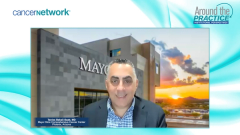
CIRCULATE-Japan: Using ctDNA to Guide Adjuvant Therapy in CRC
Daniel H. Ahn, DO, discusses the CIRCULATE-Japan trial, which is studying how ctDNA can be used to guide adjuvant therapy in colorectal cancer.
Episodes in this series

Transcript:
Tanios S. Bekaii-Saab, MD: Dan, at a high level, describe to us the CIRCULATE-Japan study, its design, what results have been published, and how we make sense out of this in our clinic.
Daniel H. Ahn, DO: The GALAXY study was part of a larger study called the CIRCULATE study [NCT04089631], and within that study, they had various different arms look at surveillance in terms of patients with resected colon cancer. Some of the arms included just surveillance if patients tested negative, while some included adjuvant chemotherapy and intensification if patients turned positive. Within that, the first arm was published. That was the GALAXY trial, which looked prospectively at patients that had stage II or stage III colon or rectal cancer that underwent surgical resection that had testing before and afterwards, and routine surveillance followed for up to 5 years. Like a lot of the data that’s already been published, they showed that in patients that have positivity, there’s a high risk for recurrence being in this study about tenfold. Some studies may suggest a 10- to 15-fold risk for recurrence, but they also showed some interesting findings, including that early testing or too early testing can be a false positive as both Joleen and Aparna mentioned.
I don’t think we understand at least that perspective of when timing should be done. I think in this study it was close to 8% where they had some false positivity where the initial tumor-informed assay was positive, but through subsequent testing, it ended up being negative. This is some discrepancy compared to Stacy Cohen’s [MD, Fred Hutch Cancer Center] study that was presented at ASCO GI [American Society of Clinical Oncology Gastrointestinal Cancers Symposium] this year, which showed that potentially testing any time between the 4- to 8-week mark would be sufficient. I don’t think we have a clear understanding of when the right time for testing is, but what the data continues to read out is that the prognostic value of a positive ctDNA and its risk for recurrence. That with more time points that we have, we can be more reassured that a true negative is going to remain negative.
Tanios S. Bekaii-Saab, MD: It’s interesting study, right? I mean, again, it’s another observational study that continues to give a sense that we may be on the right track in the way we’re thinking about this whole field of MRD [minimal residual disease] assessment and colorectal cancer. Although, it does not provide us with a final answer one way or the other.
Transcript edited for clarity.
Newsletter
Stay up to date on recent advances in the multidisciplinary approach to cancer.











































